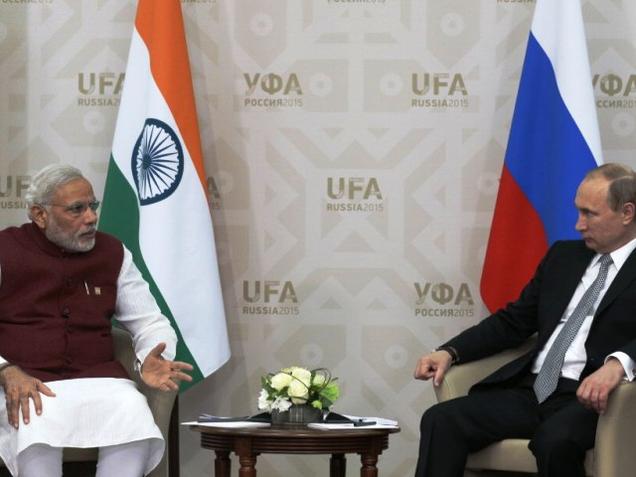
BRICS leaders are gathered in the Russian town of Ufa for the bloc’s annual summit, and internet governance is high on their agenda. The summit comes at a crucial juncture in India’s internet diplomacy. Last month in Buenos Aires, at a conference organised by the Internet Corporation for Assigned Names and Numbers (ICANN), IT minister Ravi Shankar Prasad offered an “Indian vision for the internet”. ICANN is the organisation that manages the Domain Name System, which serves as the backbone for all technical and commercial activity in cyberspace. In his recorded message, Mr. Prasad declared India would move away from state-led approaches to governing the internet, preferring instead a mechanism that co-opts the private sector and civil society into the policy-making process. India’s embrace of this model – called “multi-stakeholderism” – was followed at home by the launch of the “Digital India week”, which underlined the enormous political capital that the Narendra Modi government has invested in technological solutions to governance. The Buenos Aires declaration, however, merely stated New Delhi’s position: in Ufa, Prime Minister Narendra Modi and his delegation will be queried extensively by their interlocutors on the consequent cyber strategies India will pursue.
Modi’s Russian hosts, in particular, are concerned by the developments of last month. Having long considered India as a traditional ally in mooting a prominent role for governments in cyberspace, Russian diplomats in attendance at ICANN were caught off guard by Prasad’s statement. Ahead of the summit, Moscow has circulated a zero draft among BRICS members that devotes substantial space to internet governance. The Russian intervention is unlikely to make it to the BRICS communiqué in its current avatar, given disparity in views among the grouping’s members. Those differences, however, do not diminish the unique role that BRICS can play in calling out deficiencies in the present system, especially as it relates to the monopolistic hold US businesses have over the internet.
New Delhi, a late entrant to global cyber-politics, should steer clear of the ideological discourse that currently clouds the internet governance debate. Pegging countries as defenders or detractors of “internet freedom” does little to identify their core interests. In contrast to India, all four BRICS constituents will head to Ufa with clear motivations. A successful summit in Ufa will be a shot in the arm for Russian President Vladimir Putin’s continued efforts to defy Western attempts at political isolation. On the cyber front, Moscow is concerned about sanctions on civilian internet services and software that the United States has imposed in the Crimea. ICANN being a California-based corporation subject to US laws, has had no option but to comply with these sanctions. At the summit, Russia would want to highlight the consequences of unilateral US control of cyberspace.
China, for all the noise around its home grown, self-sufficient internet, has been among the most active participants in international cyber negotiations. Last week, China’s top cybersecurity official Lu Wei attended the inaugural council meeting of the Net Mundial Initiative in Sao Paulo, where he spoke of the need to “safeguard the normal order of the internet.” Not only did Lu engage the Initiative – a discussion platform co-hosted by Brazil, ICANN and the World Economic Forum that India has cautiously stayed away from – but he also took Jack Ma, founder of Chinese e-commerce giant Alibaba, with him to the event. Jack Ma was elected co-chairman of the council. The Communist Party may be the final arbiter of internet policies in China but it is clear that Beijing sees “multistakeholderism” as a diplomatic tool to promote its own businesses, which are vying with American internet giants in global markets.
Brazil, a leader in internet diplomacy, has highlighted the legal and political concerns associated with ICANN’s incorporation in the United States. “The legal status of ICANN should constitute an indispensable element” of any proposal to transition key DNS functions to the global community, the Brazilian government has argued. For its part, the US recently courted a state visit by Dilma Rouseff in an attempt to defuse the still-simmering controversy surrounding the Snowden revelations of US snooping on the Brazilian president. At the summit, Brazil will attempt to steer the BRICS position to neutral territory, while espousing the cause for greater “internationalisation” of internet policy-making.
South Africa may not enjoy the same profile as its BRICS counterparts on cyber policies, but it remains a pivotal player in the G77 group of developing economies. During recent consultations hosted by the United Nations, South Africa spoke for the G77, and highlighted the important role of governments in articulating internet policy.
Where does India fit in this equation? By endorsing the “multistakeholder” line, New Delhi has suggested it is willing to play by the rules the US has set for governing cyberspace. To follow up, the Modi government must convey two important messages to its American interlocutors. First, that “multistakeholderism” does not mean business as usual – India’s support for US-centric institutions will be conditioned by their utility to domestic internet companies and users. ICANN’s policies on auctioning domains, protection of digital trademarks and copyrights, and access to the WHOIS database of registered sites must be reviewed to reflect developing country concerns. Second, the US government must nudge its internet corporations to establish a credible information-sharing platform with the Indian government to identify potential cybersecurity threats. The BRICS summit offers India a megaphone to relay yet another message. New Delhi will play ball with the US, that message should read, but will not hesitate to shake hands with those countries that seek a “de-monopolisation” of critical internet infrastructure.
(Arun Mohan Sukumar is a lawyer and journalist.)
